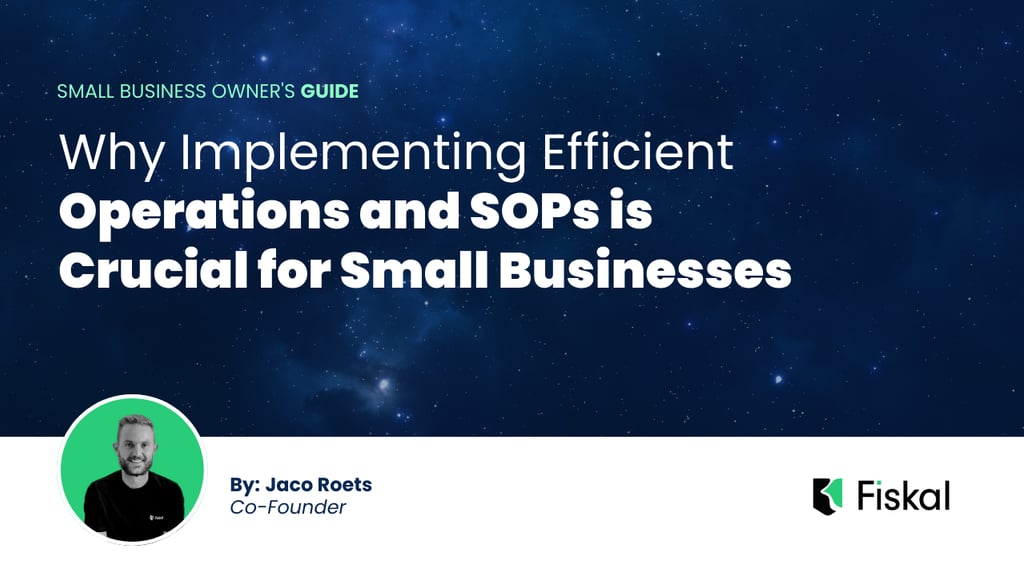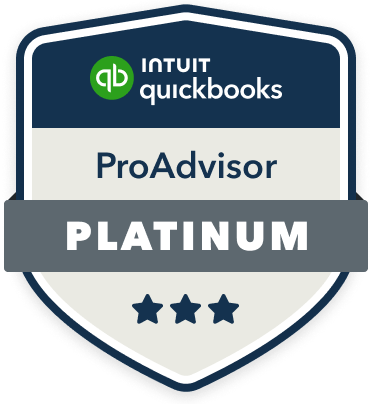Why Implementing Efficient Operations and SOPs is Crucial for Small Businesses
Running a successful small business is a lot like conducting a symphony. Every aspect needs to work together seamlessly to create a harmonious experience. And at the heart of this symphony are efficient operations and SOPs (Standard Operating Procedures). In today's competitive business landscape, implementing and adhering to efficient operations and SOPs is crucial for small businesses. It can be the key to their success and sustainability. When operations are streamlined and SOPs are in place, small businesses are better able to maintain consistency, manage resources effectively and deliver high-quality products or services. Efficient operations and SOPs help create a productive and organized work environment. Employees know what is expected of them, resulting in improved performance and reduced errors. Additionally, having clear processes in place can help small businesses scale their operations as they grow. In this article, we will explore the importance of efficient operations and SOPs for small businesses, and how they can be implemented effectively. Whether you're a new entrepreneur or a seasoned business owner, understanding and implementing these essential strategies can significantly impact your business's success. So, let's dive in and discover the key to unlocking your small business's full potential.
SYSTEMS AND SOFTWARE


The importance of efficient operations and SOPs for small businesses
Small businesses operate in a highly competitive and dynamic environment, where the ability to adapt quickly and maintain consistent quality is crucial for success. Efficient operations and well-defined Standard Operating Procedures (SOPs) are the foundation for small businesses to achieve this.
Without a strong operational framework, small businesses can struggle with inconsistent service, wasted resources, and difficulty scaling their operations as they grow. Inefficient operations can lead to frustrated customers, dissatisfied employees and ultimately, a decline in profitability and market share.
On the other hand, when small businesses prioritize efficient operations and SOPs, they can create a more organized and productive work environment, improve customer satisfaction and increase their chances of long-term success. By establishing clear processes and procedures, small businesses can ensure that tasks are completed consistently, resources are utilized effectively and employees are empowered to perform their roles effectively.
Understanding operations management and SOPs
Operations management is the study and practice of managing the processes and systems that transform inputs (such as materials, labor, and information) into outputs (such as products or services) that deliver value to customers. In the context of small businesses, operations management encompasses the planning, organizing and controlling of all the activities required to produce and deliver the products or services.
Standard Operating Procedures (SOPs), on the other hand, are detailed, step-by-step instructions that outline the specific actions and tasks required to complete a particular process or activity. SOPs are essential for ensuring consistency, quality, and efficiency in the operations of a small business. They provide a clear and standardized approach to performing tasks, which helps to reduce errors, improve productivity and ensure that the business operates in a consistent and predictable manner.
Effective operations management and well-designed SOPs work hand-in-hand to create a smooth and efficient workflow within a small business. By aligning operations with clear procedures, small business owners can streamline their processes, reduce waste, and improve overall performance. This, in turn, can lead to increased customer satisfaction, enhanced employee morale and ultimately, a more profitable and sustainable business.
Benefits of implementing efficient operations and SOPs
Implementing efficient operations and SOPs can provide a range of benefits for small businesses, including:
Improved consistency and quality: With clear procedures in place, small businesses can ensure that tasks are performed consistently, reducing the likelihood of errors and inconsistencies in the products or services they deliver. This helps to maintain a high level of quality and customer satisfaction.
Increased productivity and efficiency: By streamlining processes and eliminating unnecessary steps, small businesses can improve the overall efficiency of their operations. This can lead to faster turnaround times, reduced waste and better utilization of resources.
Enhanced scalability: As a small business grows, efficient operations and SOPs provide a framework for scaling the business without compromising quality or consistency. This allows small businesses to expand their operations and take on more customers or clients without becoming overwhelmed.
Improved resource management: Effective operations management and SOPs help small businesses to better understand and control their resource usage, including labor, materials and equipment. This can lead to cost savings and more efficient allocation of resources.
Stronger employee engagement and morale: When employees have clear guidelines and expectations, they are more likely to feel empowered and invested in the success of the business. This can lead to higher levels of job satisfaction, reduced turnover and improved overall employee performance.
Better decision-making: Efficient operations and SOPs provide small business owners with valuable data and insights about their business processes, which can inform more informed and strategic decision-making.
By leveraging the benefits of efficient operations and SOPs, small businesses can position themselves for long-term success and sustainability in a competitive market.
Common challenges faced by small businesses without efficient operations and SOPs
Small businesses that lack efficient operations and well-defined SOPs often face a range of challenges that can hinder their growth and success. Some of the most common challenges include:
Inconsistent service or product quality: Without standardized procedures, small businesses may struggle to maintain consistent quality in their products or services, leading to dissatisfied customers and a damaged reputation.
Inefficient resource utilization: Without a clear understanding of their operational processes, small businesses may waste resources, such as time, materials and labor, resulting in higher costs and reduced profitability.
Difficulty in scaling the business: As a small business grows, the lack of efficient operations and SOPs can make it challenging to scale the business without compromising quality or consistency.
Increased risk of errors and mistakes: Without clear guidelines and procedures, employees may be more prone to making errors, which can lead to rework, customer complaints and potentially even legal or regulatory issues.
Lack of employee accountability: Without well-defined roles, responsibilities and procedures, it can be difficult to hold employees accountable for their performance, which can lead to a lack of ownership and reduced productivity.
Challenges in training and onboarding new employees: Without documented SOPs, small businesses may struggle to effectively train and onboard new employees, leading to longer learning curves and potential inconsistencies in the way tasks are performed.
Difficulty in identifying and addressing operational bottlenecks: Without a clear understanding of their operations, small businesses may struggle to identify and address the root causes of operational inefficiencies, leading to ongoing challenges and missed opportunities for improvement.
By addressing these challenges through the implementation of efficient operations and SOPs, small businesses can create a more stable, scalable and sustainable foundation for their success.
How to develop and implement efficient operations and SOPs
Developing and implementing efficient operations and SOPs is a critical step for small businesses looking to improve their performance and long-term viability. Here are the key steps to follow:
Assess your current operations: Begin by thoroughly documenting and analyzing your current business processes, identifying areas of inefficiency, bottlenecks and inconsistencies. This will provide a clear understanding of where improvements are needed.
Prioritize critical processes: Identify the most critical processes within your business, such as those that have the greatest impact on customer satisfaction, revenue generation or operational efficiency. These will be the focus of your SOP development efforts.
Map out your processes: Create detailed process maps or flowcharts that illustrate the steps involved in each critical process. This will help you to visualize the workflow, identify areas for improvement and document the necessary steps for your SOPs.
Develop your SOPs: Based on your process maps, create detailed, step-by-step SOPs that outline the specific actions and responsibilities required to complete each task. Ensure that your SOPs are clear, concise and easy to follow.
Implement your SOPs: Roll out your SOPs to your employees, providing comprehensive training and support to ensure that they understand and follow the new procedures. Encourage feedback and be prepared to make adjustments as needed.
Continuously review and improve: Regularly review your SOPs and operational processes to identify areas for improvement. Seek feedback from employees and customers and be willing to adapt your procedures as your business evolves.
Leverage technology: Utilize tools and technologies, such as workflow management software, project management platforms, and process automation solutions, to streamline your operations and support the implementation of your SOPs.
Communicate and train: Ensure that all employees are aware of the importance of efficient operations and SOPs and provide ongoing training and resources to help them understand and follow the established procedures.
By following these steps, small businesses can develop and implement efficient operations and SOPs that drive improved consistency, productivity and scalability, ultimately leading to greater success and sustainability.
Key components of an effective SOP
Effective Standard Operating Procedures (SOPs) are essential for ensuring consistent and efficient operations within a small business. Here are the key components that should be included in an effective SOP:
Purpose and scope: Clearly define the purpose of the SOP and the specific process or activity it covers. This helps to ensure that the SOP is aligned with the overall objectives of the business.
Roles and responsibilities: Clearly define the roles and responsibilities of each employee involved in the process, outlining their specific tasks and the expected outcomes.
Step-by-step instructions: Provide detailed, step-by-step instructions that outline the specific actions required to complete the process. These instructions should be clear, concise and easy to follow.
Necessary materials and equipment: Identify all the materials, equipment and resources required to complete the process, ensuring that employees have access to the necessary tools.
Quality control and monitoring: Incorporate quality control measures and monitoring procedures to ensure that the process is being followed correctly and that the desired outcomes are being achieved.
Safety and compliance: Incorporate any relevant safety protocols, regulatory requirements or industry standards that must be adhered to during the process.
Troubleshooting and contingency planning: Provide guidance on how to address common issues or challenges that may arise during the process and outline contingency plans for handling unexpected situations.
Approval and version control: Establish a system for approving and versioning SOPs, ensuring that employees are always working with the most up-to-date and accurate information.
Training and communication: Outline the training and communication requirements for ensuring that all employees are aware of and understand the SOP.
By incorporating these key components into your SOPs, small businesses can create a solid foundation for consistent, efficient and scalable operations that support long-term success.
Tools and technologies to streamline operations and SOPs
In today's digital age, there are a wide range of tools and technologies that small businesses can leverage to streamline their operations and SOPs. Here are some of the most effective solutions:
Workflow management software: Tools like Trello, Asana, or Basecamp can help small businesses to map out their processes, assign tasks and track the progress of various projects and activities.
Process automation solutions: Platforms like Zapier, IFTTT, or Microsoft Power Automate can help to automate repetitive tasks, such as data entry, email management or document processing, freeing up employees to focus on more strategic priorities.
Document management systems: Solutions like Google Drive, Dropbox or Microsoft SharePoint can provide a centralized repository for storing and managing SOPs, policies and other critical business documents, ensuring that employees have easy access to the information they need.
Training and onboarding platforms: Tools like Trainual, Lessonly or TalentLMS can help small businesses to create and deliver comprehensive training programs, ensuring that employees are equipped with the knowledge and skills they need to follow SOPs and perform their roles effectively.
Project management software: Solutions like Asana, Trello or Monday.com can help small businesses to plan, organize, and track the progress of various projects and initiatives, including the implementation of new SOPs or process improvements.
Business intelligence and analytics tools: Platforms like Tableau, Power BI, or Google Analytics can provide small businesses with valuable insights into their operations, helping them to identify areas for improvement and make more informed decisions.
Enterprise resource planning (ERP) systems: Comprehensive ERP solutions like QuickBooks, Xero, or NetSuite can help small businesses to integrate and manage various aspects of their operations, including accounting, inventory and supply chain management.
By leveraging these tools and technologies, small businesses can streamline their operations, improve efficiency and enhance their ability to scale and grow over time. Additionally, many of these solutions offer features and integrations that can support the development and implementation of effective SOPs, further strengthening the overall operational capabilities of the business.
Training and resources for small businesses to improve operations and SOPs
Improving operations and SOPs is a critical priority for small businesses, but it can be a daunting task for those without prior experience or access to the right resources. Fortunately, there are a variety of training and resources available to help small business owners and their teams develop the skills and knowledge needed to implement efficient operations and effective SOPs.
Online courses and tutorials: Platforms like Udemy, Coursera, or edX offer a wide range of online courses and tutorials on topics such as operations management, process improvement and SOP development. These resources can provide small business owners and their employees with the foundational knowledge and practical skills needed to enhance their operational capabilities.
Industry associations and professional organizations: Many industry-specific associations and professional organizations, such as the National Federation of Independent Business (NFIB) or the U.S. Chamber of Commerce, offer resources, training programs and networking opportunities focused on operational efficiency and best practices for small businesses.
Small business development centers (SBDCs): SBDCs are a nationwide network of centers that provide free or low-cost consulting, training, and resources to small business owners. These centers often have experts on staff who can assist with operational planning, process improvement and SOP development.
Mentorship and peer-to-peer learning: Connecting with experienced small business owners or industry mentors can be a valuable way for small business owners to learn from others who have successfully navigated the challenges of implementing efficient operations and SOPs.
Consulting and advisory services: For small businesses that have the budget, engaging with a professional consulting firm or advisory service can provide specialized expertise and guidance on optimizing operations and developing effective SOPs.
Online resources and guides: There are numerous online resources, such as government websites, industry publications and small business blogs, that offer free guides, templates and best practices for improving operations and SOPs.
By leveraging these training and resource options, small business owners can build the knowledge and skills needed to implement efficient operations and effective SOPs, ultimately positioning their businesses for long-term success and sustainability.
Conclusion: The impact of efficient operations and SOPs on small business success
In today's competitive business landscape, the ability to maintain consistent, efficient and scalable operations is a critical success factor for small businesses. By implementing effective operations management strategies and well-designed Standard Operating Procedures (SOPs), small businesses can create a solid foundation for sustainable growth and long-term success.
The benefits of efficient operations and SOPs are numerous and far-reaching. They can lead to improved consistency and quality in the products or services a small business delivers, increased productivity and resource utilization, enhanced scalability as the business grows and better decision-making through data-driven insights. Additionally, effective operations and SOPs can foster a more engaged and empowered workforce, as employees have clear guidelines and expectations and feel invested in the success of the business.
However, small businesses that lack efficient operations and SOPs often face a range of challenges, including inconsistent service or product quality, inefficient resource utilization, difficulty in scaling, increased risk of errors and challenges in training and onboarding new employees. By addressing these challenges through the development and implementation of effective operations and SOPs, small businesses can position themselves for long-term success and sustainability.
The key to successful implementation lies in a comprehensive and strategic approach. Small businesses must first assess their current operations, prioritize critical processes and then develop detailed, step-by-step SOPs that incorporate best practices and industry standards. Leveraging technology, such as workflow management software and process automation solutions, can further streamline operations and support the ongoing maintenance and improvement of SOPs.
Ultimately, the impact of efficient operations and SOPs on small business success cannot be overstated. By creating a more organized, productive and scalable business, small business owners can focus on their core strengths, deliver exceptional value to their customers and position their companies for long-term growth and profitability. It is a strategic investment that can pay dividends for years to come.












